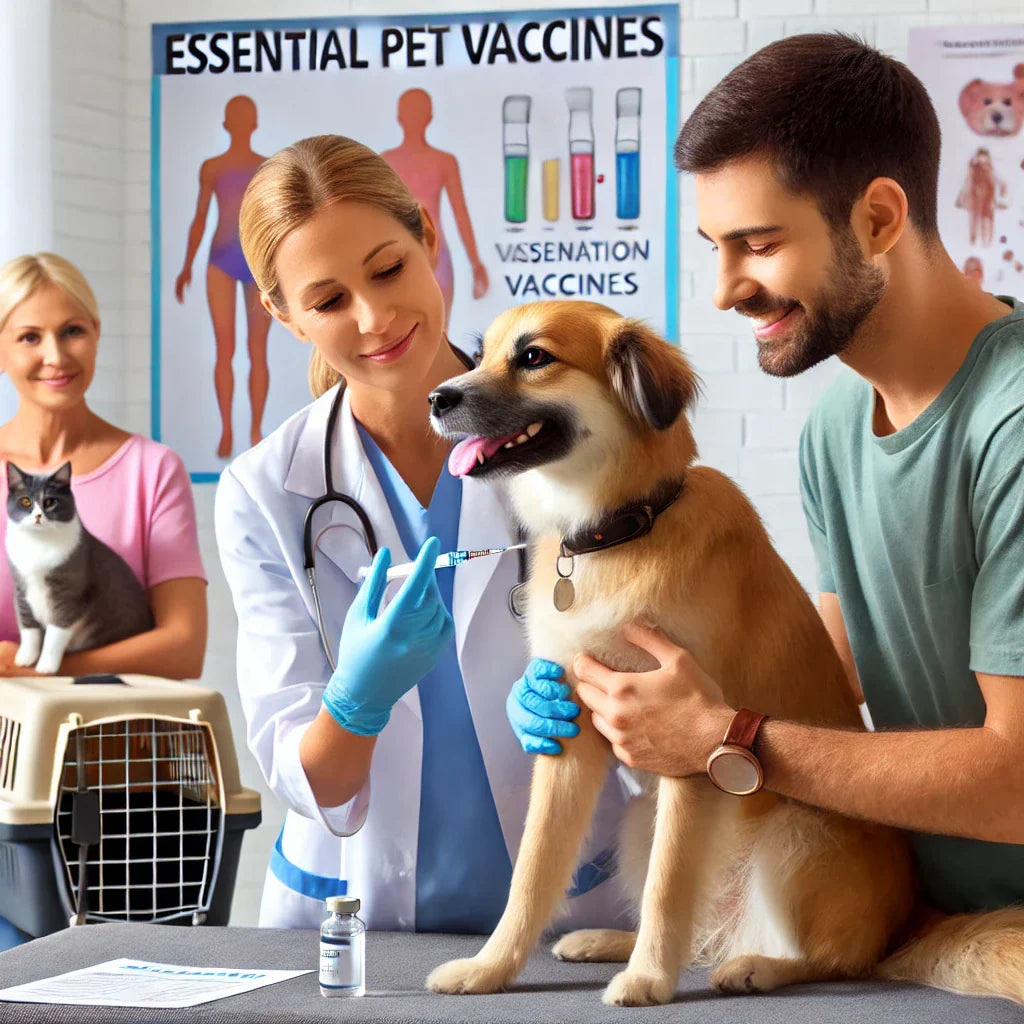
6 Essential Vaccines That Could Save Your Pet’s Life
Share

Introduction: Why Pet Vaccinations Are Essential
Vaccinations are critical for protecting pets from life-threatening diseases. Whether you have a puppy, kitten, adult pet, or senior companion, core pet vaccinations provide long-term immunity against deadly infections.
What You’ll Learn in This Guide:
✔ Which vaccines are essential for dogs and cats?
✔ How often should pets get vaccinated?
✔ Why rabies, distemper, and parvovirus vaccines are crucial?
✔ The role of vaccinations in long-term pet health
🐾 Identify distress signals early to prevent serious health issues—vaccinations reduce the risk of many preventable illnesses.
1. Core Vaccinations for Dogs and Cats: What You Need to Know
📌 What Are Core Vaccines for Pets?
Core vaccines protect against highly contagious and often fatal diseases in dogs and cats. These vaccines are recommended for all pets, regardless of breed, lifestyle, or location.
Core Vaccines for Dogs:
✔ Rabies – A deadly viral disease that affects the nervous system.
✔ Canine Distemper – Causes respiratory, gastrointestinal, and neurological issues.
✔ Parvovirus (CPV-2) – A severe and often fatal viral infection.
✔ Adenovirus (Hepatitis) – Affects the liver and respiratory system.
Core Vaccines for Cats:
✔ Rabies – Legally required in most regions.
✔ Feline Viral Rhinotracheitis (FVR) – A respiratory infection caused by herpesvirus.
✔ Feline Calicivirus (FCV) – Affects the respiratory and oral systems.
✔ Feline Panleukopenia (FPV) – Also known as feline distemper, a severe gastrointestinal disease.
🐾 Pair vaccinations with proper nutrition for optimal pet health—a healthy immune system supports vaccine effectiveness.
2. The Importance of Rabies Vaccination for Pets
📌 Why Is the Rabies Vaccine Important?
🚨 Rabies is fatal and has no cure—this vaccine is not just important, it's legally required in most areas. Rabies spreads through bites and saliva, posing a threat to pets, wildlife, and humans.
Rabies Vaccination Schedule:
✔ First dose: 12–16 weeks of age
✔ Booster: 1 year later
✔ Additional boosters: Every 1–3 years, depending on local regulations
🐾 Catch illnesses early with these warning signs—unvaccinated pets are more vulnerable to fatal infections.
3. Canine Distemper & Parvovirus: The Most Dangerous Dog Diseases
📌 Why Are These Dog Vaccines Essential?
🚨 Canine Distemper:
✔ Attacks the respiratory, nervous, and digestive systems.
✔ Symptoms: Fever, coughing, nasal discharge, seizures.
✔ High mortality rate, especially in puppies.
🚨 Canine Parvovirus (CPV-2):
✔ Highly contagious and deadly for dogs.
✔ Symptoms: Severe vomiting, bloody diarrhea, dehydration.
✔ Requires intensive medical treatment—vaccination is the best prevention.
Canine Vaccine Schedule for Distemper & Parvo:
✔ Puppy shots: 6–8 weeks old, followed by boosters every 3–4 weeks until 16 weeks.
✔ Adult dogs: Boosters every 1–3 years, depending on risk factors.
🐾 Take steps to prevent serious infections with early detection—timely vaccination is key.
4. Feline Leukemia Virus (FeLV) & Cat Vaccination Essentials
📌 Is the FeLV Vaccine Necessary?
✔ Feline Leukemia Virus (FeLV) weakens the immune system, making cats prone to secondary infections.
✔ It is spread through saliva, grooming, and shared food bowls.
✔ Not all cats need this vaccine—it's mainly for outdoor cats or multi-cat households.
FeLV Vaccine Schedule:
✔ First dose: 8–12 weeks of age
✔ Booster: 3–4 weeks later
✔ Annual booster: Recommended for at-risk cats
🐾 Complement vaccines with natural remedies for minor ailments—support your cat’s immune system with holistic care.
5. Understanding Annual Pet Vaccination Schedules
📌 How Often Should Pets Receive Booster Shots?
💉 Puppies & Kittens:
✔ Series of vaccines starting at 6–8 weeks old.
✔ Boosters every 3–4 weeks until 16 weeks.
💉 Adult Dogs & Cats:
✔ Boosters every 1–3 years, depending on the vaccine type.
✔ Some vaccines require annual boosters, while others last 3 years.
💉 Senior Pets:
✔ Consider titer testing to check immunity levels before re-vaccinating.
✔ Discuss personalized vaccination plans with your vet.
🐾 Don’t forget about senior pets—here’s how to care for them—aging pets may have different vaccine needs.
6. Pet Vaccination Side Effects: What to Expect
📌 Are There Risks to Vaccinating Pets?
Most pets tolerate vaccines well, but mild side effects can occur:
✔ Temporary lethargy or soreness at the injection site.
✔ Mild fever or reduced appetite.
✔ Rare allergic reactions: Facial swelling, vomiting, or difficulty breathing.
When to Call Your Vet:
🚨 Severe vomiting or diarrhea lasting over 24 hours.
🚨 Swelling, pain, or infection at the injection site.
🚨 Signs of a severe allergic reaction (anaphylaxis).
🐾 Identify distress signals early to prevent serious health issues—monitor your pet after vaccinations.
